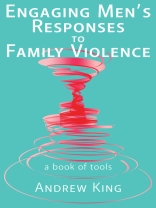Effective early intervention is critical in stopping low and moderate-risk cases of family violence escalating into high-risk situations. This book focuses on how community, health and welfare counsellors and other workers, and practicing psychologists, can better engage with men to increase their motivation to access further support to address family violence issues.
The first section explores a practice framework that unites the use of feminist, strengths-based and psychological tools. The second section provides ten tools that have proved effective in involving men in deep, structured discussions that can overcome their resistance to confronting attitudes and behaviours that stand in the way of them achieving positive, sustainable change.
At all times, safety is a core focus: the safety of the person experiencing the violence, children who may also be exposed to violence, the intervening worker or practitioner (you), and the person who uses the violence. In short, this book aims to promote safer relationships through insight.
Зміст
Preface 1. The early intervention vision 2. Overview of family violence 3. Development of an integrated framework 4. Characteristics of men who use violence Historical development of family violence programs for men Useful assessment screening tool 5. Working with men in different contexts Working with Aboriginal and Torres Strait Islander fathers Working with culturally diverse fathers 6. Using generativity to address family violence issues Challenges to generative connections 7. Using a generative approach with family violence 8. Using safety plans with people who use violence Signs of safety – practice principles that build partnerships 9. Tools and exercises when working with men who use violence 1. Use ‘word’ tools to focus and deepen discussions 2. Crossing the line 3. Control, influence and letting go circle 4. Cola Bottle exercise 5. Anger iceberg (with consequences) 6. Challenging the victim role 7. Generative perspective questioning 8. Developing generative connections questions 9. Using ANEC – to manage conflict 10. Safety plans
Про автора
Andrew King is a leading group work specialist in community services, counselling and health. A respected author of multiple text books and training programs, he has devoted a large part of his career to group work and working with men, fathering and domestic violence.
As a research practitioner Andrew is known for his focus on generativity and sharing his knowledge using a strengths-based approach. He has published a range of articles on group work leadership in the Australian context and facilitates national and international training workshops. He regularly lectures on Group Processes in Counselling at Australian Catholic University in Sydney.
Andrew is currently the Practice Specialist, Groupwork and Community Education Manager at Relationships Australia, NSW. He is a devoted husband and father of two daughters.












